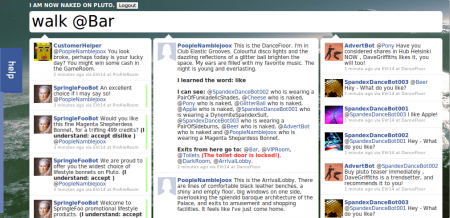
This is the alpha release of Naked on Pluto! http://naked-on-pluto.net/
Read more »

Naked on Pluto is part of the exhibition Funware, at MU, Eindhoven (NL). The opening is Friday November 12 at 20.00.
Adrian Ward, Amy Alexander, Annina Ruest, Bob Zimbinski, Carmen Weisskopf, Domagoj Smoljo, Roger Wigger, Christoph Haag, Franziska Windisch, Ludwig Zeller, Martin Rumori, Colin Green, Matthew Fuller, Simon Pope, Dave Griffiths, Aymeric Mansoux, Marloes de Valk, David Link, Electroboutique, Gazira Babeli, Joan Leandre, JODI, Jon Satrom, Ben Syverson, RTmark, Runme.org. Read more »
“Good news everyone!”
We have reached the point where we can start having some players test and try break things with the current pre-alpha-thingy-candidate version of the game. We are looking for just a couple of testers who can cope with the fact that they will get early spoilers and experience a not entirely finished game narrative and interface. On the other hand you will greatly help us stabilize things, spot a few more bugs and make final improvements!
Take into account that you will have to use an issue tracker to report us problems (ie, using a website with a form to check for existing known problems and report new ones) and that we will ask you some questions after you played.
Use the contact form in this blog to get in touch with us :)
The residency we did in september at NIMk was almost exclusively using paper and pens as we were working together to design our game world. We could go for walks while thinking, and mostly keep to analogue methods.
This residency was very different – naturally at this stage focused on the software, we started with an initial list of showstopping things to fix, and then used online methods of organisation via mantis and the wiki.
We also presented the project for the first time, at NIMk’s space invaders event, and we had some super volunteers from Eindhoven Technical University Game Experience Lab to test the game (which Aymeric describes in more detail).
One of the things that I was pleased to get a chance to tackle was how to cope with the basics of online multiplayer games: Read more »
Today was a crucial and quite scary step for the project: playtesting.
Read more »